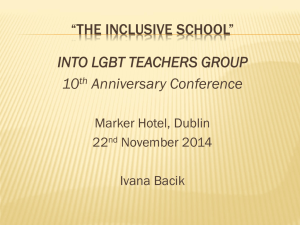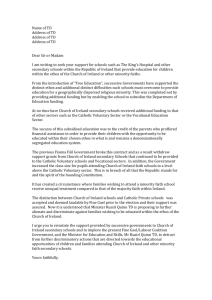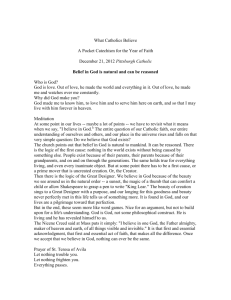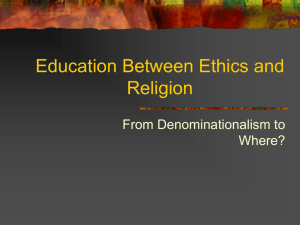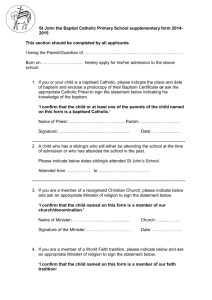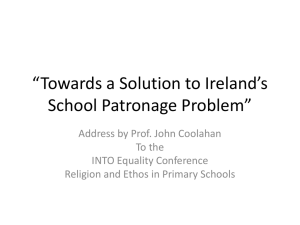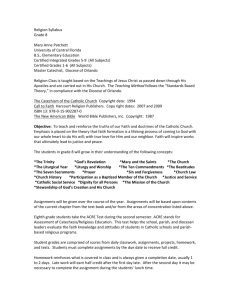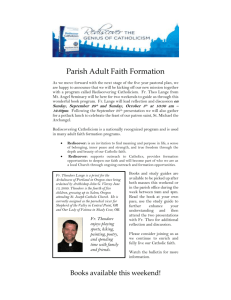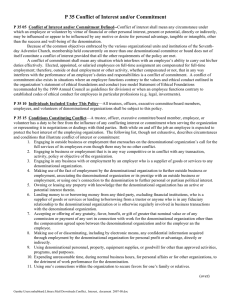now - Irish Human Rights & Equality Commission
advertisement
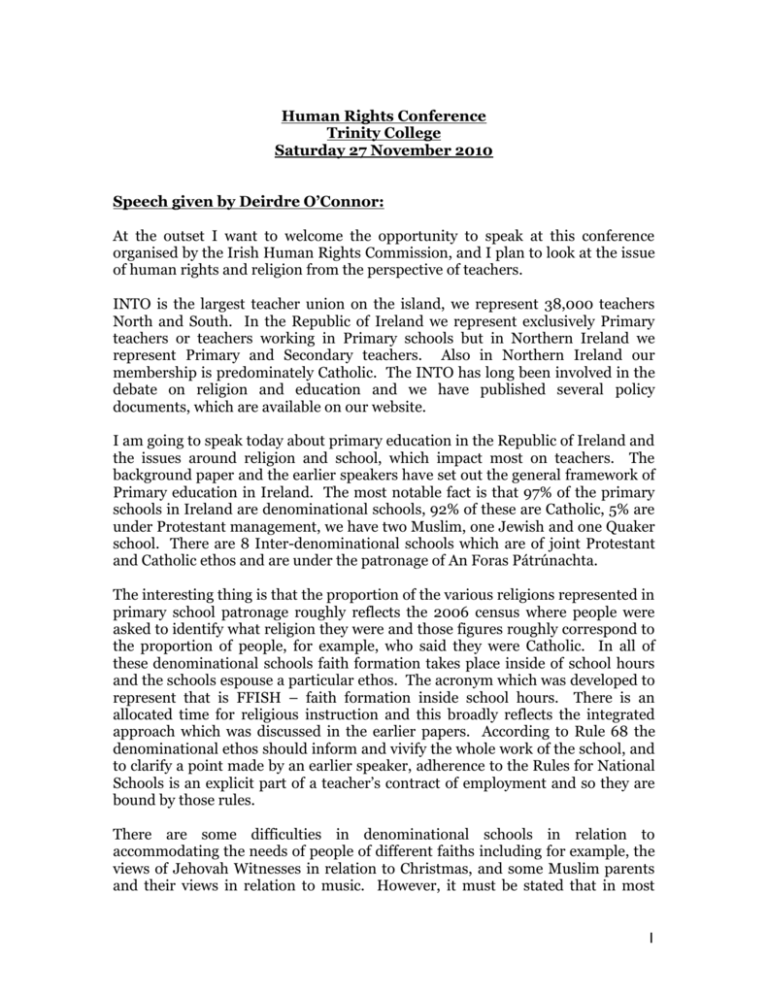
Human Rights Conference Trinity College Saturday 27 November 2010 Speech given by Deirdre O’Connor: At the outset I want to welcome the opportunity to speak at this conference organised by the Irish Human Rights Commission, and I plan to look at the issue of human rights and religion from the perspective of teachers. INTO is the largest teacher union on the island, we represent 38,000 teachers North and South. In the Republic of Ireland we represent exclusively Primary teachers or teachers working in Primary schools but in Northern Ireland we represent Primary and Secondary teachers. Also in Northern Ireland our membership is predominately Catholic. The INTO has long been involved in the debate on religion and education and we have published several policy documents, which are available on our website. I am going to speak today about primary education in the Republic of Ireland and the issues around religion and school, which impact most on teachers. The background paper and the earlier speakers have set out the general framework of Primary education in Ireland. The most notable fact is that 97% of the primary schools in Ireland are denominational schools, 92% of these are Catholic, 5% are under Protestant management, we have two Muslim, one Jewish and one Quaker school. There are 8 Inter-denominational schools which are of joint Protestant and Catholic ethos and are under the patronage of An Foras Pátrúnachta. The interesting thing is that the proportion of the various religions represented in primary school patronage roughly reflects the 2006 census where people were asked to identify what religion they were and those figures roughly correspond to the proportion of people, for example, who said they were Catholic. In all of these denominational schools faith formation takes place inside of school hours and the schools espouse a particular ethos. The acronym which was developed to represent that is FFISH – faith formation inside school hours. There is an allocated time for religious instruction and this broadly reflects the integrated approach which was discussed in the earlier papers. According to Rule 68 the denominational ethos should inform and vivify the whole work of the school, and to clarify a point made by an earlier speaker, adherence to the Rules for National Schools is an explicit part of a teacher’s contract of employment and so they are bound by those rules. There are some difficulties in denominational schools in relation to accommodating the needs of people of different faiths including for example, the views of Jehovah Witnesses in relation to Christmas, and some Muslim parents and their views in relation to music. However, it must be stated that in most 1 cases the local denominational primary school is one of the most inclusive institutions in any area The second set of schools is the sixty-nine multi-denominational primary schools, which make up roughly 2% of the schools; those are primarily Educate Together schools and in those schools the children are taught a broad-based ethics programme. Faith formation takes place outside of school hours, generally on school premises and the acronym which we use for that is FFOSH – Faith formation outside school hours. The third group of schools is the community Primary schools under VEC patronage – two in Dublin 15 and three opened this year in Naas, Navan and Balbriggan. “These schools are faith inclusive inter-denominational schools” where religion is taught inside school hours on a roughly 80% together and 20% separate model. These are very new schools and so there are still many issues in relation to the religion programme there which have to be worked out. So what are the main issues arising for teachers? The first one that I want to examine is the implication of fall off in practice, particularly among the Catholic majority. A study by the European Social Survey published in September 2010 by the Catholic Bishops showed that 45.2% of Catholics in the Republic of Ireland attend Mass on a weekly or more often basis, and that’s a steep fall from 63% in 2002/3 and a steady 80% in the 1980s. Teachers are concerned that they are being left to hand on a faith to children whose parents do not practice, without the traditional support of the clergy due to the fall off to the number of priests. This becomes particularly relevant in relation to the sacraments and yet there is a huge value placed on these occasions as social occasions and rites of passage. Teachers feel that the religious preparation for these events is being entirely left to teachers while parents prepare for the other aspects of the celebration. The second issue is that we will assume that some teachers are in the 55% of the population who don’t attend mass or practice regularly, and the issue arises then in relation to teaching a faith that is not practised but upheld in their teaching. Teachers do accept that this is part of their work in denominational schools. Some teachers may be able to negotiate out of teaching religion at school level for example by not taking the sacramental classes or by swapping with another teacher for religion instruction. The second challenge is in relation to upholding the ethos and in particular concerns about life-style. The most famous case which was mentioned this morning is that of Eileen Flynn who was dismissed from her teaching post in 1982 when she was pregnant with the child of her partner, a married man. In the case, the Holy Faith Sisters alleged that they had to give primary consideration to the interest of pupils and that Ms. Flynn’s “open rejection of the norms and behaviour and ideals which our school exist to promote” were the grounds for dismissal. This dismissal was upheld in the High Court. 2 Notwithstanding the passing of the Employment Equality Acts, 1998-2008, teachers concerns about their vulnerability remain, particularly due to Section 37.1 of the Employment Equality Act, which states that a religious-run institution shall not be taken to discriminate if it gives more favourable treatment to an employee or a perspective employee where it is reasonable to maintain the religious ethos or where it takes reasonable action to prevent an employee or perspective employee from undermining the ethos of the institution. INTO has always opposed this clause and continues to call for its deletion. Concerns in relation to this matter have been instrumental to the setting up of two support groups within the family of the INTO. In the 1980s the Separated Teacher Support Group was formed. The INTO LGB Group, which was founded in 2004 which seeks to break the twin pillars of invisibility and silence which gay and lesbian teachers say characterise their work in primary schools. This month an INTO member Ms. Michelle McKeever won an Employment Equality case where the Equality Officer was satisfied that the fact of her being Protestant was the reason why a post which had been awarded to her was withdrawn. She was awarded €12,600, the maximum compensation in relation to access to employment. The INTO has welcomed this finding on the basis that it shows that general provisions of the Employment Equality Acts do apply to religious-run institutions. It is interesting to note that in this case the school did not argue that Section 37.1 was applicable; their argument was purely made on procedural grounds. The argument of Section 37.1 would also have been difficult to maintain because the teacher said that she was familiar with and prepared to teach the Catholic religion programme. In relation to the issue of accommodating diversity, segregation and opting out, anyone who is familiar with Primary schools knows that trying to organise and teach and give parity of esteem to many different faiths and those of no faith is a challenge. In denominational schools, difficulties exists in terms of resources, in supervising and providing alternatives to those who wish to opt out of denominational formal instruction. In the interdenominational context you may recall the case of an INTO member called Tomas O Dulaing, who was dismissed from his post as Principal in a interdenominational gaelscoil in 2002 after he wrote to parents objecting to a direction from the Board to segregate children and to carry out all religious instruction in school hours. This case highlighted the difficulties in teaching two denominational faiths in one school. In the multi-faith VEC schools, the challenge of teaching the myriad of faiths, which are represented in those schools also poses similar challenges. In conclusion, teachers are acutely aware of the role of religion in education in their everyday working lives. They are used to negotiating the challenges posed by being the keepers of the flame in denominational schools, passing on a faith not widely practised in the wider community and perhaps not by themselves. 3 They are also aware of the implications of upholding the ethos of the institution in which they work and in particular their concerns that a lifestyle which in most employments would be considered nobodies business but their own may be a barrier to employment or promotion. Teachers also try to accommodate the increased diversity of the pupil population representing each faith within the school setting, whatever the school type. Many issues remain to be resolved. 4
